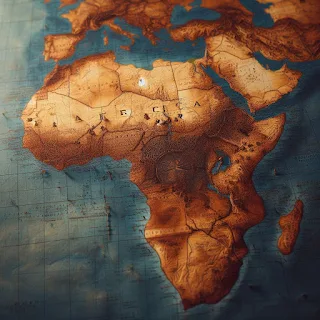The African Mediterranean Coastline
Morocco, Algeria, Tunisia, Libya, and Egypt are five African countries with coastlines along the Mediterranean Sea.
Exploring Africa's Mediterranean Coastline.
The Mediterranean Sea is a nearly landlocked sea bordered by Southern Europe to the north, North Africa to the south, and Western Asia to the east. For millennia, it has been a cradle of civilization.
Ancient civilizations such as the Egyptians, Phoenicians, Greeks, and Romans thrived along its shores. It served as a major trade route, facilitating the exchange of goods, ideas, and cultures between Europe, Asia, and Africa.
The Mediterranean has witnessed numerous historical events, including the Punic Wars between Rome and Carthage, the rise and fall of the Byzantine Empire, and the spread of Islam across North Africa and southern Europe. During the Middle Ages, the Mediterranean was a focal point of the Crusades, with European powers vying for control over key coastal cities.
The Mediterranean Sea has long been a crucial trade hub connecting these North African nations to Europe, Asia, and the Middle East. Throughout history, this sea facilitated the exchange of goods, ideas, and cultures, shaping the development of these countries and contributing to their rich and diverse heritage.
Carthage, an ancient city in Tunisia, was one of the major trading powers in the Mediterranean before the rise of Rome, exemplifying the region's historical significance as a trading crossroads.
Five African countries that have a coastline along the Mediterranean Sea
Located in North Africa, Morocco features a diverse landscape that includes the Atlas Mountains, the Sahara Desert, and a picturesque coastline along the Mediterranean Sea. The country is known for its rich history, with influences from Berber, Arab, and European cultures. Historic cities like Marrakech, Fes, and Casablanca are famous for their vibrant markets, intricate architecture, and cultural heritage. Morocco has a Mediterranean coastline that extends for approximately 1,835 kilometers or 1,139 miles.
Algeria is the largest country in Africa and has a long Mediterranean coastline. Its history is marked by the ancient Berber civilization, Roman ruins such as Timgad, and a long period of French colonial rule. The capital, Algiers, is a coastal city known for its white-washed buildings and historical Casbah. Algeria boasts one of the longest Mediterranean coastlines in Africa, stretching for approximately 1,622 kilometers or 1,007 miles.
Tunisia is known for its beautiful Mediterranean beaches, particularly in areas like Hammamet and Sidi Bou Said. The country is steeped in history, with Carthage being one of its most famous ancient cities. It was a major power in the Mediterranean before the rise of Rome. Tunisia's Mediterranean coastline is approximately 1,148 kilometers or 713 miles long.
Libya has a lengthy Mediterranean coastline with beautiful coastal towns like Tripoli and Benghazi. The country has a complex history, from ancient civilizations like the Phoenicians and Romans to more recent events such as the rule of Muammar Gaddafi and the subsequent civil conflicts. Libya's coastline along the Mediterranean Sea is extensive, measuring roughly 1,770 kilometers or 1,100 miles.
Egypt, although primarily associated with its Nile River, also has a Mediterranean coastline along the northern part of the country. The Mediterranean city of Alexandria, founded by Alexander the Great, is famous for its ancient library and lighthouse. Egypt is home to iconic historical sites like the Pyramids of Giza and the temples of Luxor. Egypt has a Mediterranean coastline that extends for approximately 1,050 kilometers or 652 miles.
African countries along the Mediterranean Sea face challenges
African countries bordering the Mediterranean Sea, particularly Libya and Tunisia, have been at the forefront of the Mediterranean migration and refugee crisis.
They serve as transit points for migrants and refugees attempting to reach Europe. This crisis poses humanitarian challenges, as migrants and refugees undertake perilous journeys, and it also has political and social implications for the host countries in North Africa.
Maritime security, including its African coastline, is a significant concern in the Mediterranean Sea. Piracy and maritime crime have been reported in certain areas, such as off the coast of Somalia and the Gulf of Guinea, affecting the security of shipping lanes and coastal communities. These security challenges hinder trade and economic activities, impacting the stability and development of these African nations.






